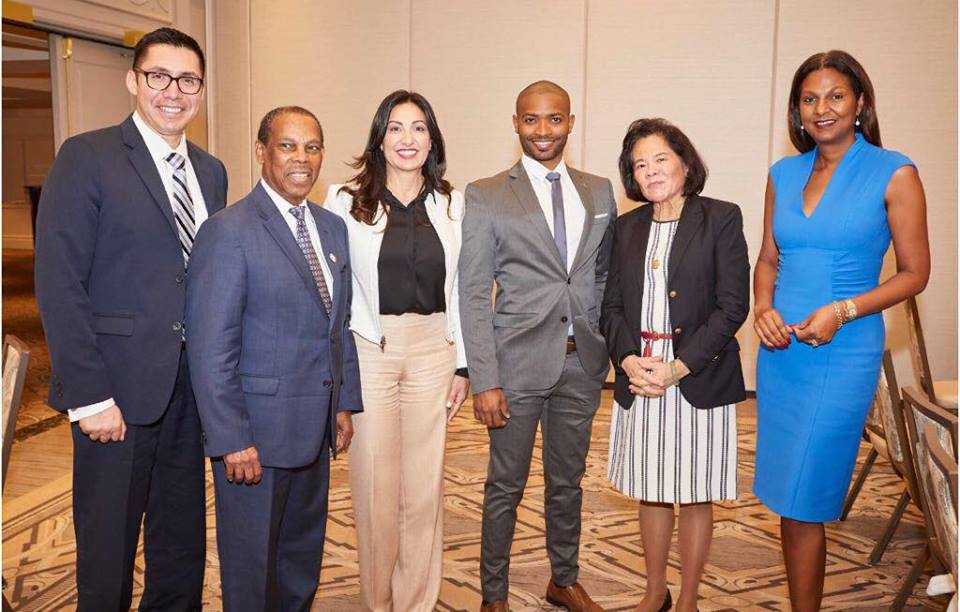
SCLAN creates alliances for health initiatives- Entity has partnered with the Business Centre for International Understanding (BCIU)
Image: (R-L) Spouse of the Prime Minister of Belize and Chair of SCLAN, Mrs. Kim Simplis Barrow, First Lady of Guyana and Vice Chair of SCLAN, H.E. Mrs. Sandra Granger, Dr. David Walcott (Jamaica), Mrs. Elizabeth Murray (Gilead Sciences), Dr. Edward Greene (PANCAP) and Mr. Ramon Zertuce (Gilead)
Since the Launch of the Spouses of CARICOM Leaders Action Network (SCLAN) in Belize in September 2017 emphasis has been placed on establishing partnerships to advance the objectives of the Network. On June 26, 2018, a Dialogue between the Business Centre for International Understanding (BCIU) and Spouses of CARICOM Leaders Action Network (SCLAN) was held in the Grand Ballroom, Inter-Continental Barclay Hotel, New York. SCLAN was represented by Her Excellency Mrs. Kim Simplis Barrow, Spouse of the Prime Minister of Belize (Chair) and Her Excellency Mrs. Sandra Granger, First Lady of Guyana (Vice Chair). BCIU was represented by its President and CEO Mr Jirair Tichansky who chaired the Dialogue.
Also in attendance were members of Gilead Sciences Inc., including Mrs. Elizabeth Murray, Director of Latin America Access and Emerging Markets. Since the Network’s Inception in 2017, Gilead Sciences Inc. has committed to assist the First Ladies in building stronger collaborations to maximize synergies across the regions. Through their access programs, the company assists developing countries to address high incidences of HIV, including the elimination of mother-to-child transmission by offering HIV medications at substantially reduced prices.
The aim of the dialogue in New York City was to form alliances with the Business Centre in support of the four main pillars of the “Every Caribbean Woman Every Caribbean Child” Initiative for which SCLAN advocates. These include reducing adolescent pregnancies, violence against women and girls, cervical cancer and eliminating mother-to-child transmission of HIV. These pillars fall within the priorities of the PANCAP JFA Roadmap.
Other participants at the Dialogue also expressed support for SCLAN’s Programme. Among them were representatives from Chevron Corporation, Hess Corporation, AB INBEV Ltd, IHG, ORBIS, Henry Schein Inc., Rabin Martin, UNAIDS, PANCAP and a number of NGOs including AIDS for Life, Infiniti Partnership, Global Coalition of the Ageing, Thirty Steve East, Mount Sinai Medical System, UNIDOS EN RED and Physicians for Human Rights.
Dr Tedros Adhanom Ghebreyesus, WHO Director-General and his Team, also responded positively to the initiative and agreed to foster links with SCLAN in the context of WHO’s 5-year Development Plan which includes the goals of achieving Universal Health Coverage and responding to the health challenges of climate change especially among the SIDS in the Caribbean and the Pacific.
Mrs Barrow in thanking the participants, said ‘this dialogue has opened the doors for worthwhile partnerships that would contribute to the viability of SCLAN in its efforts to make a difference in the lives of women, girls, and adolescents in the Caribbean.”
WHAT IS PANCAP?
PANCAP is a Caribbean regional partnership of governments, regional civil society organisations, regional institutions and organisations, bilateral and multilateral agencies and contributing donor partners established on 14 February 2001. PANCAP provides a structured and unified approach to the Caribbean’s response to the HIV epidemic, and coordinates the response through the Caribbean Regional Strategic Framework on HIV and AIDS to maximise efficient use of resources and increase impact, mobilise resources and build the capacity of partners.
What are the Global AIDS Strategy 2021–2026 targets and commitments?
If targets and commitments in the strategy are achieved:
- The number of people who newly acquire HIV will decrease from 1.7 million in 2019 to less than 370 000 by 2025
- The number of people dying from AIDS-related illnesses will decrease from 690 000 in 2019 to less than 250 000 in 2025.
- The goal of eliminating new HIV infections among children will see the number of new HIV infections drop from 150,000 in 2019 to less than 22,000 in 2025.
What are the 95-95-95 Targets for ending AIDS?
- 95% of People Living with HIV know their HIV status;
- 95% of people who know their status on treatment; and
- 95% of people on treatment with suppressed viral loads.
HELPFUL LINKS:
Global AIDS Strategy 2021–2026, End Inequalities, End AIDS
https://pancap.org/pancap-documents/global-aids-strategy-2021-2026-end-inequalities-end-aids/
Caribbean Regional Strategic Framework on HIV and AIDS (CRSF) 2019-2025
https://pancap.org/pancap-documents/caribbean-regional-strategic-framework-2019-2025/
